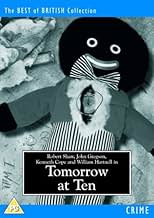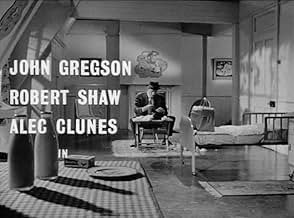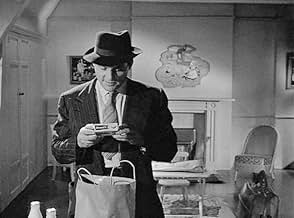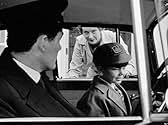Es una carrera contra el tiempo para la policía cuando tienen que encontrar a un niño secuestrado encarcelado con una bomba de tiempo, después de que su secuestrador muere sin revelar el par... Leer todoEs una carrera contra el tiempo para la policía cuando tienen que encontrar a un niño secuestrado encarcelado con una bomba de tiempo, después de que su secuestrador muere sin revelar el paradero del niño.Es una carrera contra el tiempo para la policía cuando tienen que encontrar a un niño secuestrado encarcelado con una bomba de tiempo, después de que su secuestrador muere sin revelar el paradero del niño.
Opiniones destacadas
A surprisingly engaging feature sees John Gregson as a detective ("Insp. Parnell") brought into investigate the kidnap of the son of the wealthy "Chester" (Alec Clunes). Interestingly the kidnapper "Marlow" (Robert Shaw) has locked the child into an attic room in an unknown London address then gone to the man's home to demand the ransom in person - so we know all the characters from the start. Midway through, he there is an altercation and suffice to say the policeman has to try and track down the child from scratch. It's quite suspenseful, and the tight-knit cast keep the story moving well with quite a degree of jeopardy building, too.
Suspenseful thriller in which Robert Shaw gets the lion's share as a kidnapper of a wealthy man's only son.The story almost entirely focuses on the villain and (it's rare ) tries to explain the reason why he did it .It's not only a matter of money as the viewer little by little discovers .The things themselves play a prominent part ,the ticking of the clocks or a jumping jack .The kidnapper is at hand ,under the police's eye ,like in more modern thrillers such as "oxygen" ;and of course there is a quarrel between the scared father and the police .The whole film is a race against the clock ,for the boy is in a house with a time bomb.
Not bad, especially because of the exceptional actor who was Robert Shaw. John Gregson is also very good, natural. All the actors are very good, which makes the film bearable, since everything is just talk, just boring dialogue.
When I watch a film like TOMORROW AT TEN, I'm a bit bemused because I can't understand why it's not better known. This is a cracking little thriller, one of the best of its era, and it really should be talked about today by film fans instead of being forgotten by all but the most dedicated viewers of the era. It's a pity that B-movie thrillers like this one are so little known as this sort of film more than holds its own against modern fare.
There's no padding or fat in this story which gets going from the outset. A delightfully mannered Robert Shaw (on the cusp of stardom in FROM Russia WITH LOVE, although TOMORROW AT TEN was made in 1962 and not released until 1965) plays a kidnapper who abducts the son of a rich businessman and locks him in a room with a bomb hidden inside a Golliwog. The boy's father and a local detective inspector must negotiate before the bomb explodes - 'tomorrow at ten'.
It's a great concept and the experienced director Lance Comfort makes a fine job of it. There's suspense in spades here, alongside plot twists you won't see coming and a delightfully tense race-against-the-clock (literally!) climax. The supporting cast includes notable roles for Kenneth Cope, Alec Clunes (father of Martin), Harry Fowler, William Hartnell, and Renee Houston. John Gregson's long-suffering detective inspector is one of the most sympathetic of his career.
There's no padding or fat in this story which gets going from the outset. A delightfully mannered Robert Shaw (on the cusp of stardom in FROM Russia WITH LOVE, although TOMORROW AT TEN was made in 1962 and not released until 1965) plays a kidnapper who abducts the son of a rich businessman and locks him in a room with a bomb hidden inside a Golliwog. The boy's father and a local detective inspector must negotiate before the bomb explodes - 'tomorrow at ten'.
It's a great concept and the experienced director Lance Comfort makes a fine job of it. There's suspense in spades here, alongside plot twists you won't see coming and a delightfully tense race-against-the-clock (literally!) climax. The supporting cast includes notable roles for Kenneth Cope, Alec Clunes (father of Martin), Harry Fowler, William Hartnell, and Renee Houston. John Gregson's long-suffering detective inspector is one of the most sympathetic of his career.
A chap called Marlowe (Robert Shaw, Jaws fans) kidnaps a child of Hampstead parents by posing as the school-run chauffeur. After depositing the child in a deserted mansion, that resembles the one in Fallen Idol, he calmly turns up at the parent's house demanding 50 big ones. He's planning on catching the afternoon TWA to Rio see from where he'll book a long distance call to tell dad where his kid is hid. Now here's the clever bit. If he doesn't get his dough an explosive device hidden in a Golliwog will detonate tomorrow at ten and he's given the Golliwog to the child for safekeeping.
I bought this DVD from Best of British series issued by Odeon. It's the sort of thing which used to pad out afternoon schedules in the distant days of 3 channel Britain. It's directed by Lance Comfort, who made films for RKO in the 40s and even directed James Mason once upon a time. Comfort, however, never really made a big film and subsequently became lost in the culturally reviled wasteland of second features many for Butchers Film Service. In recent years there's been an attempt to re-evaluate Comfort's work. There's even been a monograph by Brian McFarlane and one of his films was compared to Resnais on this very website no less (Pit of Darkness).
This one is not quite typical of the second feature era. For a start it's a little bit later (1964) than that. Also there are a few moments that actually remove the film from the largely sealed world of the British B movie. There's even a cute reference to Z cars as Shaw whistles the theme tune while preparing the Golliwog bomb. Incidentally, I feel that an absence of any sort of popular culture from British B's of the 1957-63 era (new towns, West Indians, jeans, the teenage industry, etc) makes them strangely representative of their era. The fashion today for film makers to drench film soundtracks with the pop music of the film's era is not only a lazy way of establishing period flavour but to me rings false. Pop music may be all pervasive now for the ipod generation, if only superficially, but how many middle aged middle class people in the 50s/ 60s had any interest in pop culture beyond a vague awareness of Elvis and the Beatles maybe?
No matter, this film features John Gregson in the lead, as Inspector Parnell investigating the kidnapping, and two stars of the future in the aforementioned Shaw and Kenneth Cope (Cope pops up at the Er Golliwog Club the way the girls are dancing here has to be seen to be believed and interrogates Renee Houston who later pops up as his battleaxe mum in Carry On At Your Convenience, trivia fans). Ironically it's Gregson as the established star who is a bit miscast here. He's called to play a maverick cop who goes against his superior, Bewley (Alan Wheatley). Unfortunately, Gregson is far too meek and mild of voice and manner to carry any conviction. The film is very much of its decade though when it pits working class cop Parnell against patrician, hunt ball brown noser Bewley, who simply wants to let Marlowe skip to Brazil with his loot. Unfortunately what could have been a rip roaring barney between the two one man embodying the 1950s and the other the 1960s has all potential drama rung out of it by the laborious manner in which Parnell explains that perhaps this wouldn't be such a great idea ("What the hell are you talking about?")
Better is the psychological stand off between Parnell and Marlowe as the Inspector tries to break Marlowe down with a seemingly innocuous line of questioning. We see a little glimpse of what a great character actor Shaw was to become; the authenticity of his behaviour and accent lifting the film momentarily out of the fusty B world into something more contemporary.
I bought this DVD from Best of British series issued by Odeon. It's the sort of thing which used to pad out afternoon schedules in the distant days of 3 channel Britain. It's directed by Lance Comfort, who made films for RKO in the 40s and even directed James Mason once upon a time. Comfort, however, never really made a big film and subsequently became lost in the culturally reviled wasteland of second features many for Butchers Film Service. In recent years there's been an attempt to re-evaluate Comfort's work. There's even been a monograph by Brian McFarlane and one of his films was compared to Resnais on this very website no less (Pit of Darkness).
This one is not quite typical of the second feature era. For a start it's a little bit later (1964) than that. Also there are a few moments that actually remove the film from the largely sealed world of the British B movie. There's even a cute reference to Z cars as Shaw whistles the theme tune while preparing the Golliwog bomb. Incidentally, I feel that an absence of any sort of popular culture from British B's of the 1957-63 era (new towns, West Indians, jeans, the teenage industry, etc) makes them strangely representative of their era. The fashion today for film makers to drench film soundtracks with the pop music of the film's era is not only a lazy way of establishing period flavour but to me rings false. Pop music may be all pervasive now for the ipod generation, if only superficially, but how many middle aged middle class people in the 50s/ 60s had any interest in pop culture beyond a vague awareness of Elvis and the Beatles maybe?
No matter, this film features John Gregson in the lead, as Inspector Parnell investigating the kidnapping, and two stars of the future in the aforementioned Shaw and Kenneth Cope (Cope pops up at the Er Golliwog Club the way the girls are dancing here has to be seen to be believed and interrogates Renee Houston who later pops up as his battleaxe mum in Carry On At Your Convenience, trivia fans). Ironically it's Gregson as the established star who is a bit miscast here. He's called to play a maverick cop who goes against his superior, Bewley (Alan Wheatley). Unfortunately, Gregson is far too meek and mild of voice and manner to carry any conviction. The film is very much of its decade though when it pits working class cop Parnell against patrician, hunt ball brown noser Bewley, who simply wants to let Marlowe skip to Brazil with his loot. Unfortunately what could have been a rip roaring barney between the two one man embodying the 1950s and the other the 1960s has all potential drama rung out of it by the laborious manner in which Parnell explains that perhaps this wouldn't be such a great idea ("What the hell are you talking about?")
Better is the psychological stand off between Parnell and Marlowe as the Inspector tries to break Marlowe down with a seemingly innocuous line of questioning. We see a little glimpse of what a great character actor Shaw was to become; the authenticity of his behaviour and accent lifting the film momentarily out of the fusty B world into something more contemporary.
¿Sabías que…?
- TriviaAbbots Mead, the disused Victorian house (referred to in the film by its real name) where Marlow takes Jonathan after he has kidnapped him, was bought by film director Stanley Kubrick shortly after this film was made. He and his family lived there from 1965-1979 and he edited many of his films, such as A Clockwork Orange, in an outbuilding alongside the house.
- ErroresWhen Parnell and Grey first meet the local police officer near Chester's house, a cylindrical microphone windshield is very obvious at the bottom of the frame.
- ConexionesFeatured in Tienes que ver esta peli: Mañana a las 10 (2022)
Selecciones populares
Inicia sesión para calificar y agrega a la lista de videos para obtener recomendaciones personalizadas
- How long is Tomorrow at Ten?Con tecnología de Alexa
Detalles
- Fecha de lanzamiento
- País de origen
- Idioma
- También se conoce como
- Chance to Live
- Locaciones de filmación
- 91 Winnington Road, Hampstead, Londres, Inglaterra, Reino Unido(14 Winnington Road - the Chesters' house)
- Productora
- Ver más créditos de la compañía en IMDbPro
- Tiempo de ejecución1 hora 20 minutos
- Color
- Relación de aspecto
- 1.37 : 1
Contribuir a esta página
Sugiere una edición o agrega el contenido que falta

Principales brechas de datos
By what name was Tomorrow at Ten (1963) officially released in India in English?
Responda



















